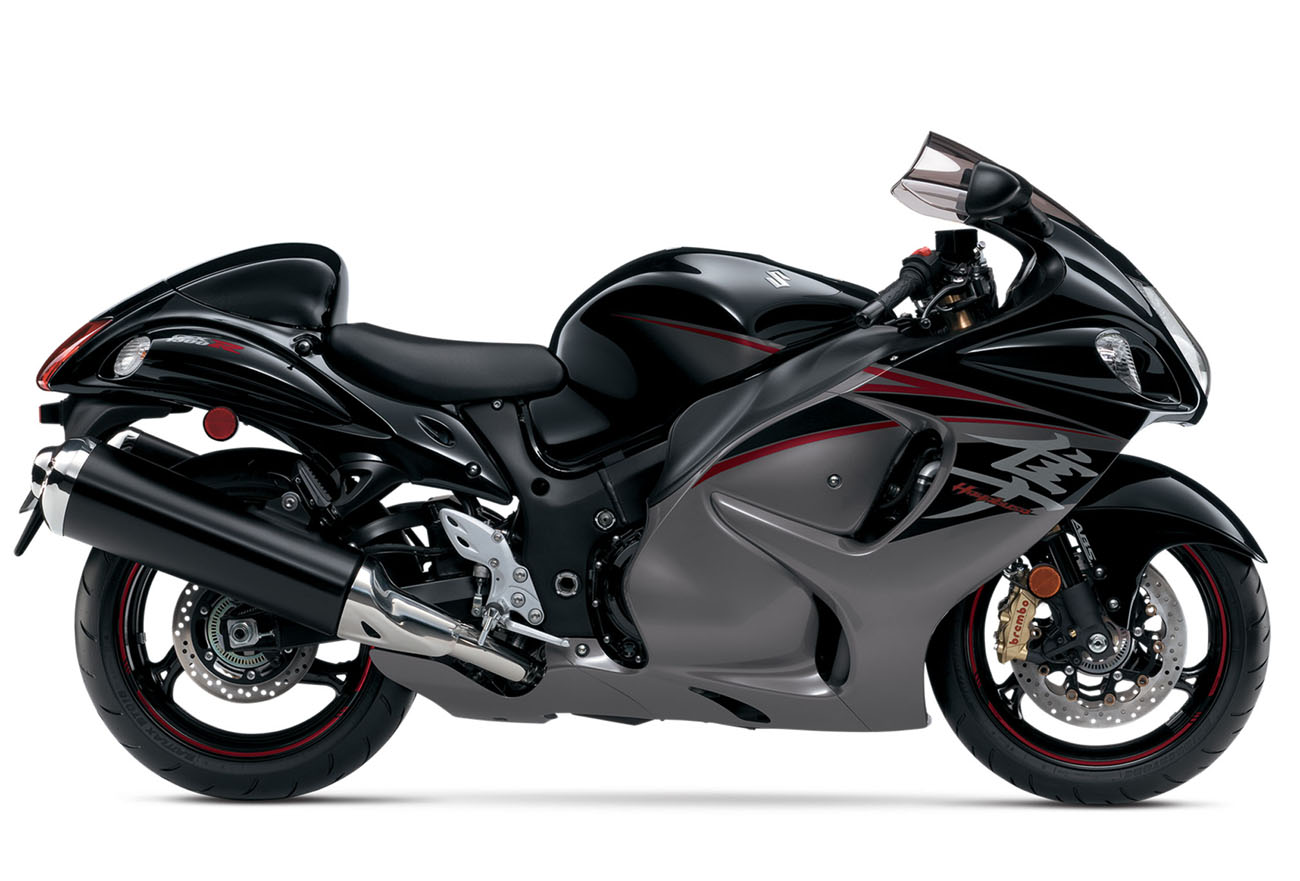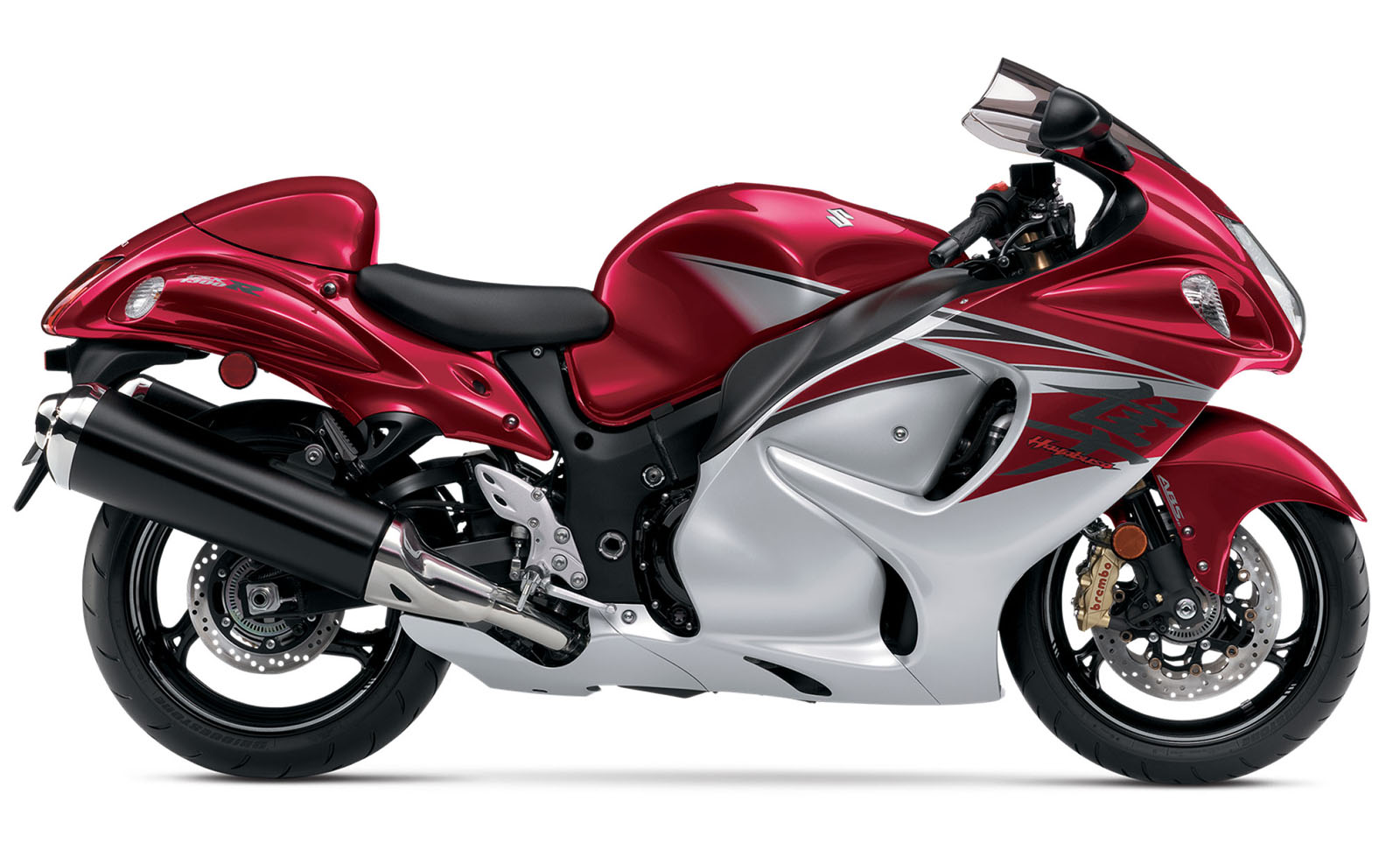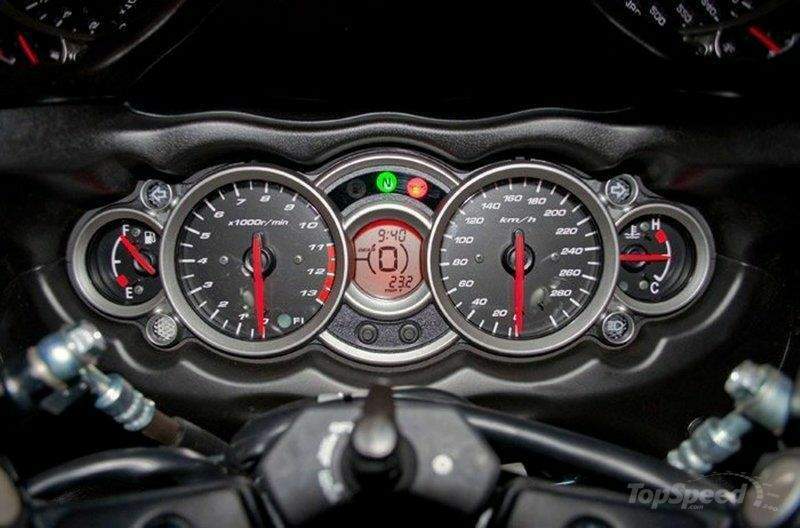
|
|
|
|
|
|
Classic Bikes
Custom Bikes
Individual
Racing Bikes AJP
AJS
Aprilia
Ariel
Avinton / Wakan
Bajaj
Benelli
Beta
Bimota
BMW
Brough Superior
BRP Cam-Am
BSA
Buell / EBR
Bultaco
Cagiva
Campagna
CCM
CF Moto
Combat Motors
Derbi
Deus
Ducati
Excelsior
GASGAS
Ghezzi Brian
Gilera
GIMA
Harley Davidson
Hero
Highland
Honda
Horex
Husaberg
Husqvarna
Hyosung
Indian
Jawa
Kawasaki
KTM
KYMCO
Laverda
Lazareth
Magni
Maico
Mash
Matchless
Mondial
Moto Guzzi
Moto Morini
MV Agusta
MZ / MuZ
NCR
Norton
NSU
Paton
Peugeot
Piaggio
Revival Cycles
Roland Sands
Royal Enfield
Sachs
Sherco
Sunbeam
Suzuki
SWM
SYM
Triumph
TVS
Ural
Velocette
Vespa
Victory
Vincent
VOR
Voxan
Vyrus
Walt Siegl
Walz
Wrenchmonkees
Wunderlich
XTR / Radical
Yamaha
Zero
Video
Technical
Complete Manufacturer List
|
Suzuki GSX 1300R Hayabusa
|
| . |
|
Make Model |
Suzuki GSX 1300R Hayabusa |
|
Year |
2016 |
|
Engine |
Four stroke, transverse four cylinder, DOHC, 4 valves per cylinder |
|
Capacity |
1340 cc / 81.8 cu-in |
|
Bore x Stroke |
81 x 65 mm |
|
Compression Ratio |
12.5:1 |
| Cooling System | Liquid cooled |
| Lubrication | Wet sump |
|
Induction |
Suzuki Fuel Injection fuel injection |
|
Ignition |
Electronic |
| Starting | Electric |
|
Max Power |
146 kW / 195.7 hp @ 9800 rpm |
|
Max Torque |
154 Nm / 15.81 kg-m / 113.6 lb-ft @ 7200 rpm |
| Clutch | Wet multi-plate, manual, hydraulic, 6 spring coil, Plates: 10 Drive, 9 Driven |
|
Transmission |
6 Speed |
| Final Drive | Chain |
|
Gear Ratio |
1st 1.596 / 2nd 2.615 / 3rd 1.937 / 4th 1.526 / 5th 1.136 / 5th 1.136 |
| Primary Drive Ratio | 1.596 (83/52) |
| Final Drive Ratio | 2.388 (43/18) |
| Frame | Design (Material): Twin-spar (aluminum alloy) |
|
Front Suspension |
Inverted telescopic coil springs, spring preload, rebound and compression damping fully adjustable |
|
Rear Suspension |
Link type, oil damped, coil springs, spring preload, rebound and compression damping fully adjustable |
|
Front Brakes |
2 x 310 mm Discs, 4 piston calipers |
|
Rear Brakes |
Single 260 mm disc, 1 piston caliper |
| Wheels Front | 17 M/C x MT3.50, cast aluminum alloy |
| Wheels Rear | 17 M/C x MT6.00, cast aluminum alloy |
|
Front Tyre |
120/70 ZR17 |
|
Rear Tyre |
190/50 ZR17 |
| Rake | 24.2° |
| Trail | 98 mm / 3.8 in |
|
Dimensions |
Length 2190 mm / 86.2 in Width 735 mm / 28.9 in Height 1165 mm / 45.9 in |
| Wheelbase | 1480 mm / 58.3in |
|
Seat Height |
805 mm / 31.7 in |
| Ground Clearance | 120 mm / 4.7 in |
| Dry Weight | 220 kg / 485 lbs |
|
Wet Weight |
266 kg / 586 lbs |
|
Fuel Capacity |
21 Litres / 5.5 US gal / 4.6 Imp gal |
| Consumption Average | 6.1 L/100 km / 16.3 km/l / 38.3 US mpg / 46.0 Imp mpg |
| Standing 0 - 100km | 3.0 sec |
| Standing 0 - 140km | 4.4 sec |
| Standing 0 - 200km | 7.3 sec |
| Acceleration 60-140 km/h | 3.9 sec |
| Acceleration 60-140 km/h | 7.1 sec |
| Acceleration 100 - 140 km/h | 3.2 sec |
| Acceleration 140 - 180 km/h | 3.4 sec |
|
Standing ¼ Mile |
10.2 sec |
|
Top Speed |
296.9 km/h / 184.49 mph |
| . |
The Ultimate Sport, In Timeless
Styling...
More than a decade ago, Suzuki developed a machine so unique
that it instantly attracted a devoted following around the
world. Like its namesake, the Japanese peregrine falcon, the
Hayabusa is famed for cutting through the air with incredible
agility and performance.
Through countless engineering refinements of the original
design, the Hayabusa spirit has endured. In 2014, the model
received Brembo Monobloc high-performance calipers and an
Antilock Brake System. Its incomparable performance delivers a
fun and sporty ride at any speed, setting the bar high for
rivals and defining the “Ultimate Sport Bike.” The radically
original yet timeless styling also reflects the spirit of the
person who owns a Hayabusa. Its sensational power, speed, smooth
ride and overwhelming presence continue to fascinate owners and
onlookers alike. Because the Hayabusa is, and always will be,
the ultimate sport bike.

1 Lighter and more rigid than conventional bolt-together
calipers, the Hayabusa's top-of-the-line radial-mount Brembo
Monobloc front brake calipers deliver better feedback to the
rider. Piston diameter was enlarged from 32-30mm to 32-32mm.
Larger pistons help apply greater force to the brake disc, which
results in increased initial bite and a more controlled feeling
2 The standard equipment Antilock Brake System (ABS) unit
features a lightweight, compact design. The ABS enhances brake
performance by helping prevent, to a certain extent, wheel
locking due to changes in road conditions or excessive braking,
by matching stopping power to available traction.
3 A 1340cc in-line 4-cylinder fuel injected, DOHC liquid-cooled
engine with 16-valves and Twin Swirl Combustion Chambers (TSCC)
provides phenomenal power and broad torque delivering breath
taking acceleration.
4 S-DMS (Suzuki Drive Mode Selector) allows the rider to choose
from three different engine settings depending on riding
conditions or rider preferences.
5 KYB inverted cartridge forks feature a
Diamond-Like Carbon (DLC) coating surface treatment on the 43mm
stanchion tubes to reduce friction and increase reaction to
small surface irregularities. Spring preload, compression
damping and rebound damping are fully adjustable.
6 The Hayabusa's instrument cluster features four analog meters
for speedometer, tachometer, fuel gauge and water temperature
with an S-DMS mode indicator, gear position indicator and
adjustable engine-rpm indicator.
7 Vertically stacked twin headlights provide increased light
intensity, improved light distribution and match the elegant
flow of the Hayabusa styling.

ENGINE FEATURES
A 1340cc in-line 4-cylinder fuel injected, DOHC liquid-cooled
engine with 16-valves and Twin Swirl Combustion Chambers (TSCC)
provides phenomenal power and broad torque delivering breath
taking acceleration.
Lightweight aluminum alloy pistons with a compression ratio of
12.5:1 are used for maximum performance in all connditions.
Hard, smooth chrome-nitride Physical Vapor Deposition (PVD)
coating on the upper compression and oil control rings on each
piston reduces friction while improving cylinder sealing.
Suzuki Composite Electrochemical Material (SCEM) cylinder
plating improves heat transfer, durability and ring seal.
Lightweight titanium valves allow the use of light valve springs
and high lift while maintaining accurate valve control. Iridium
spark plugs are used for high combustion efficiency.
Curved radiator with a compact, dense-core design and
engine-management-computer-controlled two ring-type electric
fans mounted on the rear of the radiator, increasing the control
accuracy and keeping engine temperature stable.
The Hayabusa's engine is fed by tapered, 44mm double barrel
Suzuki's SDTV (Suzuki Dual Throttle Valve) throttle bodies
utilizing dual 12-hole, fine-spray injectors per cylinder and
ram air intake with large volume airbox. This precise, carefully
controlled system improves combustion efficiency results in
improved power delivery and a more linear response.
Idle Speed Control (ISC) system improves cold starting and helps
maintain stable engine idle under various conditions.
Suzuki Pulsed-secondary AIR-injection (PAIR) system ignites
unburned hydrocarbons and reduces carbon monoxide emissions.
S-DMS (Suzuki Drive Mode Selector) allows the rider to choose from three different engine settings depending on riding conditions or rider preferences.
TRANSMISSION FEATURES
An optimized 6-speed transmission features oil spray to the 4th,
5th, and 6th gears to reduce wear and mechanical noise during
highway cruising.
Suzuki Clutch Assist System (SCAS) serves as
back-torque-limiting system for smooth downshifts and also
contributes to a light clutch pull.

CHASSIS FEATURES
A lightweight and rigid twin-spar aluminum frame minimizes
weight while maintaining high torsional strength.
KYB inverted cartridge forks feature a Diamond-Like Carbon (DLC)
coating surface treatment on the 43mm stanchion tubes to reduce
friction and increase reaction to small surface irregularities.
Spring preload, compression damping and rebound damping are
fully adjustable.
A bridged aluminum alloy swingarm features a cross-sectional
shape for increased rigidity, which also helps cope with
improved rear tire grip and increased engine output. The
Hayabusa's fully adjustable rear shock absorber has a 43mm
piston and 14mm rod diameter.
Large 310mm (12.2 inch) dual-floating-disc front brakes with
efficient, race-proven aluminum-piston, radial-mount Brembo
calipers, and 260mm (10.2 inch) single-disc rear brake with
single-piston brake caliper work together with a new ABS system
offering superior braking performance
ADDITIONAL FEATURES
The Hayabusa's instrument cluster features four analog meters
for speedometer, tachometer, fuel gauge and water temperature
with an S-DMS mode indicator, gear position indicator and
adjustable engine-rpm indicator.
Vertically stacked twin headlights provide increased light
intensity, improved light distribution and match the elegant
flow of the Hayabusa styling.
Advanced aerodynamics offering superb wind protection both for
normal and completely tucked-in seating positions.
The tire's profile and compound were developed through a variety
of testing to achieve a high level of stability and handling.

|
Any corrections or more information on these motorcycles will be kindly appreciated. |